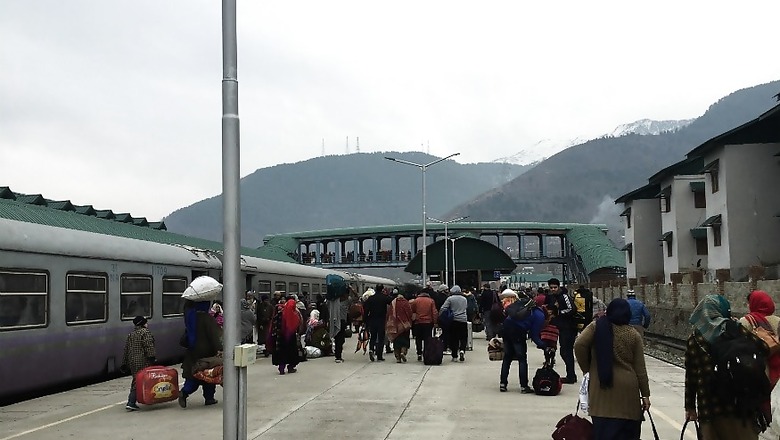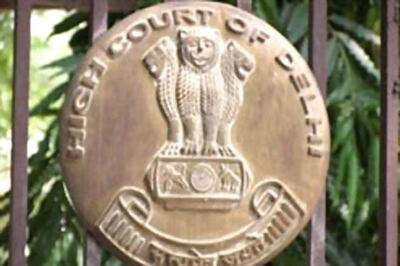
views
Srinagar: For two consecutive days, Sumaira Wani (18) left her home early in the morning, braving bone-chilling winter cold, to reach the Deputy Commissioner’s (DC) office 30 kilometers away from her home in south Kashmir’s Kokernag. She reached the office in Anantnag town 20 minutes before its time of opening.
To her disappointment, on both the days she found huge crowd waiting outside the IT section of the office, who had gathered there to avail internet facility, like her.
Wani aspires to be a doctor and is awaiting the result for her 12th class exam for which she appeared recently. She has to appear in the National Eligibility cum Entrance Test (NEET)—all India level common entrance exam for admissions to MBBS and BDS courses—to fulfill her dream of becoming a cardiologist.
But submitting the form in absence of internet has been a daunting task for many. Internet facility was snapped in Valley on August 5, hours before the Centre revoked J&K’s special status under Article 370 and bifurcated it into two union territories. Apart from internet, all communication lines, including landline and mobile phones, were blocked. Calling facility on landline and postpaid phones was resumed subsequently, but calling on prepaid phones, SMS services and internet continues to remain suspended.
Although the administration has opened ‘internet kiosks’ to facilitate people like Wani, the initiative seems insufficient given the rush of the people.
“There was so much crowd that I couldn’t even find a space to stand near the four computers which had internet connection,” Wani said. For two straight days, she returned empty-handed from the DC office.
It was at the office that someone suggested her to take the train to Banihal town where the broadband facilities are functional. Banihal of Ramban district, is a hill town on the other side of Jawahar tunnel on Jammu-Srinagar highway and is connected through road and rail by tunnels passing under the mighty Pir Panjal range.
Next day, Wani boarded the train from Anantnag station, 35 kilometers away from her home, at 9 in the morning to submit her NEET form. From boarding the train for the first time in her life to finding most of the passengers on-board going to Banihal to access the internet, it was an astonishing experience.
The Srinagar-Jammu highway, the only link between Kashmir and rest of India, passes through Banihal. Train service to the town came just six years ago.
As the train halted at Banihal station, the passengers started rushing towards buses and taxis waiting outside. Wani also boarded a bus and on reaching the town, she found everyone around her rushing towards a shop that provided internet facility.
“I didn’t ask anyone for directions. Everyone was walking towards the shops which provided internet access,” she said.
Since Banihal falls in Jammu division, the broadband services of the internet are working there. Every day hundreds of internet-deprived people of Kashmir visit the town where 12 shops offer internet services at a price of Rs 350 per hour.
Like many others, Wani also waited in a queue outside one of the shops for over 90 minutes to submit her NEET form. People lined up outside the shops visit the hilly town to get their important work, like filing GST, upgrading driving license, submitting online tenders and even research, done.
“Initially, 10 to 15 people would come every day,” said 35-year-old Nisar Ahmad Tantray, who owns one of the shops providing internet facility. Tantray, like many other shopkeepers in the town, started witnessing unusual rush of people desperate to use internet after the rail services were resumed on November 11. He had to employ four more people and get two more computers installed to meet the rising demand.
“If the work continues the same way I will have to get more computers and more operators,” he said. Tantray has seen desperate people, and says, he feels bad for the condition of the people.
“Few days ago, a student came who wanted a Wifi connection to update the online lecture on is phone which he had bought for Rs 50,000,” said Tantray. The lectures on the phone were to be updated every two months but that student had no internet access and was unable to study even at home. Yet, none of the shops in the market could give him the Wifi access as they were strictly directed by the police to not allow anyone use the internet on their personal devices.
“He returned to me at around 4 pm and requested once again. I couldn’t help him but had to tell him that he had missed the last train to Srinagar which leaves at 3 pm,” Tantray said. He then offered the boy to stay at his home for the night. The student boarded a taxi to Jammu next morning from where he went to Madanpur town in Punjab’s Pathankoat to update the lectures, Tantray said. The student had to travel over 300 kilometers away from home to get one mobile phone application updated so that he could study.
Banihal town has been abuzz with the rush of students and other professionals waiting in queues to access internet. A rush of people arrives at 10 am with the arrival of the first train and the crowd starts thinning by 3pm when the last train to Srinagar leaves.
The train has a new name in the town now-- The Internet Express.



















Comments
0 comment